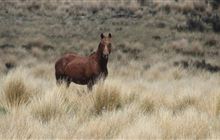Kaimanawa wild horses available for rehoming
Archived content: This media release was accurate on the date of publication.
Introduction
A minimum of 70 Kaimanawa wild horses need to be removed from the Waiouru Military Training Area, Central North Island in the next couple of months and rehoming groups are now keen to hear from prospective owners.Date: 08 March 2019
The number of horses to be removed was confirmed last week after DOC undertook its annual aerial survey.
Kaimanawa Heritage Horses (KHH) chairperson Kimber Brown and Kaimanawa Wild Horse Preservation Society (KWHPS) chairperson Sharyn Boness are urging people who are interested in taking a horse or horses from the muster, as well as those interested in sponsoring the placement and upkeep of a wild horse, to get in touch now.
Currently only 13 applications for horses have been received between both groups. With only four weeks left until applications close on 1 April there is not a lot of time left for interested parties to apply. That leaves a lot of horses still in need of caring homes with suitably experienced new owners.
According to KHH Welfare Officer Michele Haultain, the Kaimanawas coming out of the muster are true wild horses which have never been in contact with humans.
“In time they will do anything their owners ask of them, but in the early days they need sympathetic handling to ensure they make a successful transition to domestic life.
“Kaimanawas have an X-Factor; their senses are acute, and they have proven to be very trainable,” she said.
Given the right environment they are very curious, honest and friendly and are suitable for a variety of equine disciplines. Both rehoming groups are more than happy to offer prospective new owners support and advice.
Following last year’s twin musters, a decision was made to hold annual musters which allows DOC to manage the herd at the level recommended by the Kaimanawa Wild Horse Advisory Group (KWHAG). This allows for the horses in the herd to maintain best condition and also protects the fragile ecosystems, unique to the Moawhango Ecological Zone.
The unique tussock grassland where the horses roam contains threatened plants, including at least 16 species in the New Zealand Threat Classification System, some of which are found nowhere else in the world. Many of these plants occur in habitats that can withstand very little disturbance.
Kaimanawa horses are gaining favour among the equestrian community as highly competitive sport horses. Since numbers were reduced to 300 individuals in the wild herd, the condition of the horses and their final mature height, has improved immeasurably. As a result, they are more suited to a wider variety of riders.
“The rehoming of as many horses mustered is an important part of a successful muster” says DOC Operations Manager Dave Lumley.
“Ideally all suitable horses will be rehomed, as was the case for the horses mustered in 2016 and 2018. However, we know it’s a real challenge for the rehoming groups to find so many suitable homes.”
As many horses as possible will be rehomed, but any horses deemed medically unfit by a vet, will be euthanised under vet supervision.
2018 was the biggest muster since 1997 with 299 horses successfully rehomed. Although Kaimanawa Heritage Horses Welfare Society and Kaimanawa Wild Horse Preservation Society are trying desperately to rehome as many as possible, the uptake so far is minimal.
Information and applications on rehoming a Kaimanawa wild horse can be found at:
Kaimanawa Heritage Horses
Kimber Brown
Phone: +64 27 450 9047
Email: kimber@kaimanawaheritagehorses.org
Michele Haultain
Phone: +64 27 431 8082
Email: michele.haultain@kaimanawaheritagehorses.org
Kaimanawa Wild Horse Preservation Society
Sharyn Boness
Phone: +64 27 457 2040
Email: kaimanawawhps@gmail.com
Katherine Meredith
Phone: +64 27 258 8492
Email: kaimanawawhps@gmail.com
Background Information
Kaimanawa Horse Management Plan
The plan has three core objectives:
- to ensure the welfare of the horses is dealt with appropriately
- to promote the sustainability of the natural features and ecosystems of the Moawhango Ecological District, with respect to Kaimanawa wild horse impacts
- to manage the Kaimanawa wild horse herd at a sustainable level.
The Kaimanawa Wild Horse Advisory Group provides advice to DOC on implementing the management plan.
It consists of representatives from New Zealand Defence Force, DOC, Kaimanawa Heritage Horses, Kaimanawa Wild Horse Preservation Society, NgatiRangi, RNZSPCA, Forest & Bird, NZ Veterinary Association and adjoining landowners.
Kaimanawa Heritage Horses (KHH)
KHH is a charitable society run by a volunteer group of passionate horse people; dedicated to the care and welfare of Kaimanawa horses both domestically and in the wild. KHH are advocates for the horses and work closely with DOC and other interested groups on the welfare and future of the Kaimanawa horses in the wild.
Prior to each muster the group search for suitable homes and complete home-checks to place as many horses as possible. KHH actively support our members and their domestic Kaimanawa horses through our Welfare team, Area Reps, magazine, education and training, Annual Shows and Ribbon Days. Member generosity through membership and donations, is the group’s primary funding source.
Kaimanawa Wild Horse Preservation Society (KWHPS)
KWHPS was formed in April 1994 to promote the preservation and protection of the Kaimanawa Wild Horses both in the wild and domesticity.
Our vision is to create public awareness to the plight of the Wild Kaimanawa Horse Herd and to promote the versatility of the horses being brought into captivity. KWHPS actively support all members, Kaimanawa owners and prospective owners through our dedicated committee.
KWHPS currently sponsor Kaimanawa rings at two National Breed shows, ring sponsorship at six other National A&P shows and Rider sponsorship. KHWPS primary funding source is through membership and donations.
Contact
For media enquiries contact:
Email: media@doc.govt.nz

